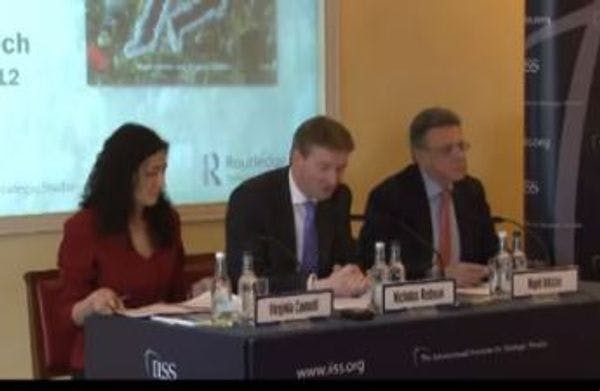Time for open, informed debate on drug policy
Latin American leaders have said recently that the West’s "war on drugs" has failed, and a new book from the International Institute for Strategic Studies agrees. At this week’s launch of Drugs, Insecurity and Failed States: The Problems of Prohibition, IISS expert and former MI6 deputy director Nigel Inkster said a new approach was needed in which drugs were treated as an issue to be managed rather than as a problem to be solved. Co-author Virginia Comolli pointed out that since the war on drugs began in 1961 with the Single Convention on Narcotic Drugs to deter trafficking and possession, none of the international treaty’s objectives had been achieved.
Worse, both authors said, banning drugs had fuelled violence and instability in the developing world, through the creation of a global black market dominated by powerful criminal groups. In some countries there had been "state capture," or subversion of institutions, by criminal networks. Other nations, where drugs now overshadowed legitimate businesses, were surviving on "junkie economies."
Inkster said that the IISS was "not an organization that engages in advocacy," but that the nearly two years of research behind the book led the authors to conclude that a fundamental rethink of drugs policy was necessary. To significantly disrupt the trade through law-enforcement strategies alone, it was estimated that some 70% of drugs supplies had to be interdicted. It was unlikely that a greater crackdown on drugs would succeed.
"Yes," he admitted to one questioner, "we are vulnerable, I suppose, to accusations of defeatism, but if one adds up the amount of resources over the past 50 years that have been devoted to creating what [a UN General Assembly Special Session] has called a ‘drugs-free world’ it’s not obvious to me that these efforts have been notably successful.
"At the end of the day what we are dealing with here is the iron laws of supply and demand. When there is a demand for a commodity, there will always be someone who seeks to meet that demand, particularly when the profits entailed are enormous – mark-ups of thousands of percent between farm gate and retail sales.
"Any first-year medical student will tell you that the first thing they are taught when they step through the door is: 'don’t just double the dose.' If your initial diagnosis doesn’t seem to be working, don’t just keep on doing the same thing and hope that something different will eventuate, because it probably won’t."
Drugs, Insecurity and Failed States focuses on the effects of the cocaine trade in Colombia and of heroin production in Afghanistan, but also covers the spill-over of violence into transit regions such as Mexico, Central America and West Africa.
At the launch, Comolli put some figures on the deleterious consequences of the drugs trade for these countries. Although Colombia, for example, had recently managed to contain the threat from FARC narco-traffickers, that success had come at an enormous cost: the country had suffered about 2-3% lost GDP growth during the 30 years of insurgency and still had a defense budget accounting for 4.5% of GDP. Populations had been displaced.
Afghanistan was "a monopoly supplier" of illicit heroin to the world, providing 85% of global output. This benefited not only powerful warlords who had become part of the Kabul government, but members of the Taliban, who were thought to derive $125 million a year from the drugs trade.
In Mexico in the past four years, there had been 47,000 drugs-related deaths, and "a pervasive culture of intimidation by narcotics traffickers." This violence had now spread to Central America, "which has taken over from the Caribbean as the principal smuggling route from drugs destined for the United States," Comolli said.
"Between 2007 and 2010, the amount of cocaine trafficked to the USA via Central America went from 1% to 95%, and levels of drugs-related violence rose correspondingly. In El Salvador, Guatemala, Honduras – the so-called ‘northern triangle’ – drugs-related homicides are now four times higher than in Mexico. Even more shockingly, they are higher than during the civil-war periods of the 1980s."
The authors stressed that, clearly, drugs were not the only element fuelling conflict in the developing world, and that it was essential to distinguish between cases of causation and correlation, where states had already experienced high levels of violence before drugs entered the picture.
However, they argued that there was need for an open, informed debate about alternatives to the current prohibition regime, based on empirical evidence.
Said Inkster: "Supporters of the status quo have for too long sought to squash such debate, without really offering convincing argumentation for their stance. The issue of drugs needs to be brought out of the specialist silo it currently occupies; it needs to be brought into the mainstream of debate on international security and economic development to a much greater degree."
Keep up-to-date with drug policy developments by subscribing to the IDPC Monthly Alert.
Regions
Related Profiles
- Open Society Foundations (OSF)
- International Institute for Strategic Studies (IISS)
